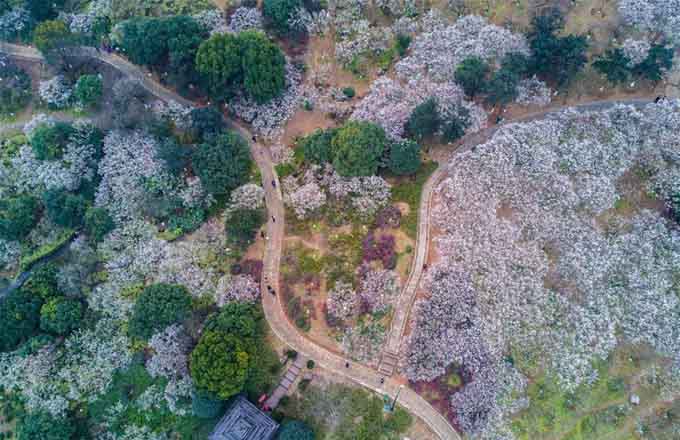China has potential to play a positive role
As President Xi Jinping embarks on his first trip to Africa as a head of state, expectations are high for the world's second-largest economy to play a greater role in the region.
Eswar Prasad, a professor at Cornell University and a former head of the China division of the International Monetary Fund, said China has the potential to play a positive role in Africa's development through the provision of financial resources and technology transfers.
 |
|
A Chinese teacher instructing her students at a middle school in South Africa in February. LI QIHUA / XINHUA |
"Given the enormous potential for growth in the continent's countries and their large reserves of natural resources, China has good reason to develop a strong economic relationship with Africa," Prasad said.
Deborah Brautigam, a professor at Johns Hopkins School of Advanced International Studies, said Chinese demand for African commodities has pushed up prices and helped African countries experience an economic boom.
 In her view, while Chinese interest has caused other countries to rethink their views that Africa was off-limits as an investment destination, Chinese banks have been creative in developing ways in which African governments without good credit ratings can leverage their assets to secure loans.
In her view, while Chinese interest has caused other countries to rethink their views that Africa was off-limits as an investment destination, Chinese banks have been creative in developing ways in which African governments without good credit ratings can leverage their assets to secure loans.
"This allows infrastructure to be built today and paid out of tomorrow's exports and profits. It's a great system," said Brautigam, author of the book The Dragon Gift: The Real Story of China in Africa.
A report by the Carnegie Endowment for International Peace released last year praised China for being the major source of foreign aid to Africa, complementing its trade and investment activities.
It dismissed the misconception that China was just a resources hunter. "Chinese investment covers a wide range of sectors including infrastructure, education and information technology. These investments can benefit Africa and all of its trading partners," said the report, authored by Shimelse Ali and Nida Jafrani. The report showed that a much higher percentage of US direct investment in Africa was in mining than that from China.
Africa has much to gain from China's growing presence on the continent, although it is not without some negative effects. Increased trade and investment links are particularly promising because they have the potential to support poverty alleviation and sustain recent economic gains, according to the report.
On Tuesday, Ministry of Commerce spokesperson Shen Danyang described China-Africa cooperation as mutually beneficial. The increased Chinese investment in Africa in recent years has boosted economic growth and tax income, created lots of jobs and helped train the local workforce, according to Shen. Meanwhile, Chinese tourists made 870,000 trips to Africa last year.
Shen said that contrary to the view of some that the Chinese are in Africa for mining or farming, they are actually expanding in manufacturing and various service industries.
Brautigam, however, pointed out that Chinese companies, in general, need to improve their labor relations. "They need to have greater concern for protecting the environment, for pollution," she said.
Although echoing Brautigam's concern, Julius Agbor, a fellow of the Africa Growth Initiative at the Brookings Institution, a Washington-based think tank, said China is playing a positive and important role in beefing up some infrastructure and investment needs of African nations.
In a recent article published on the Brookings website, Agbor and his colleagues Yun Sun and Jessica Smith, predicted China's policies toward Africa are unlikely to have major changes under the new leadership.
They found that Xi was already familiar with Africa during his five years as vice-president, meeting numerous African leaders in Beijing and going on a seven-day trip to South Africa, Angola and Botswana in November 2010.
They also found that during the Fifth Forum on China-Africa Cooperation Ministerial Conference in Beijing in July 2012, Xi participated substantially in the discussion on how to deepen Sino-African ties.
"Xi will be responsible for carrying out the $20 billion in foreign aid committed at the conference in the next three years. Between 2012 and 2015, supporting the development of Africa's infrastructure, agriculture and manufacturing industry as well as the region's small and medium-sized enterprises will be at the top of his Africa agenda," they wrote.
The Brookings scholars believe many Africans hope the new Chinese leader will move the relations to a more long-term sustainable development model, such as more technology transfers, institutional support toward strengthening local governance and paying more attention to the overall regulatory environment.
Cornell's Prasad also believes China needs to encourage more open and transparent corporate and public governance in Africa because that has important implications for more balanced and sustained growth in Africa.
"China and Africa share many problems, such as corruption and inequality, that could affect growth as well as social stability," Prasad said.
chenweihua@chinadailyusa.com
























